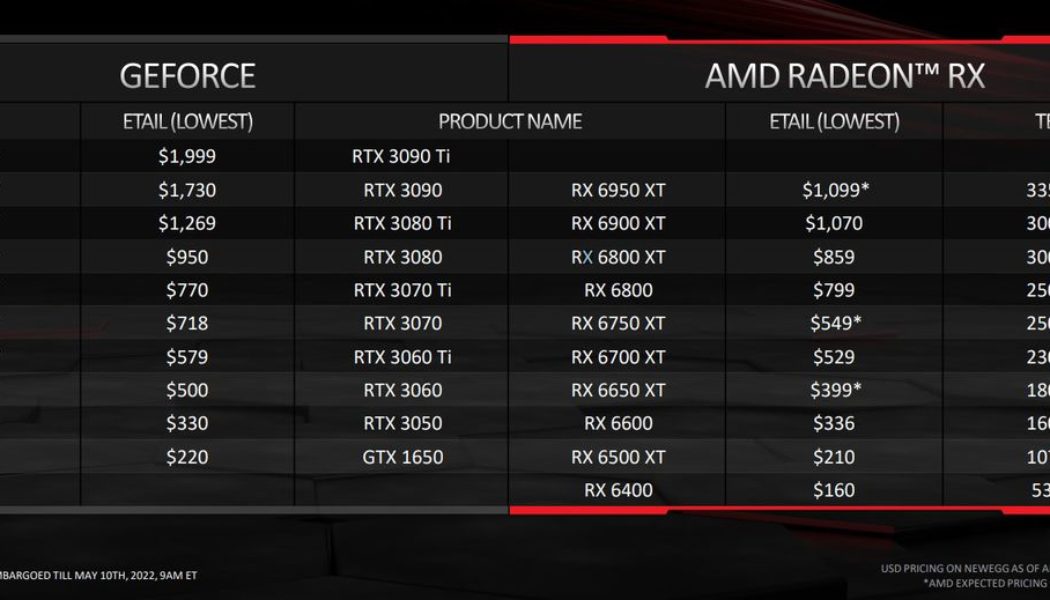It seemed like AMD and Nvidia were living in a fantasy world. They’d throw out prices like $329 or $479 for a midrange graphics card, knowing you’d actually pay hundreds more by the time pandemic middlemen had their cut. But today, AMD seems to be waking up.
With the recently announced $1,099 AMD Radeon RX 6950 XT, $549 Radeon 6750 XT, and $399 Radeon 6650 XT, the company is finally pricing its graphics cards based on the market instead of creating a fake MSRP. When you combine that with the fact AMD graphics cards have nearly come back down to sane prices in general, it means there’s a chance in hell you might actually be able to buy these new ones for the price that AMD is quoting.
:no_upscale()/cdn.vox-cdn.com/uploads/chorus_asset/file/23449836/amd_radeon_nvidia_geforce_price_comparison_amd_april_2022.jpg)
That’s good — because price is by far the most interesting thing about the cards AMD is announcing today.
While we’ve heard murmurs of next-gen AMD RDNA 3 chips on the horizon, the new RX 6950 XT, 6750 XT, and 6650 XT are nothing like that. In fact, they’re not new GPUs at all. As the “50” in their names might suggest, they’re straight-up refinements of the existing RX 6900 XT, 6700 XT, and 6600 XT with literally the exact same silicon, only with new firmware for faster clocks and faster memory.
:no_upscale()/cdn.vox-cdn.com/uploads/chorus_asset/file/23451057/Updated_AMD_Slide.png)
And while any performance boost is nice, this isn’t going to be a big one: each “50” card offers a 5 to 6 percent bump over the vanilla version. In some games, the difference can be as little as 1 frame per second, according to AMD’s reviewer’s guide. In others that run at particularly high framerates, you might see a 10fps bump or more. Also, those bumps don’t come for free: the cards have a 20 to 35W higher TDP than the originals, theoretically drawing more power and / or producing more heat.
AMD isn’t trying to hide any of this. “These are not going to be major enhancements,” the company told journalists. “Nothing physically has changed.”
Instead, the company’s trying to point out just how much more performance per dollar and performance per watt you can get compared to Nvidia — at the prices you’ll actually pay to get Nvidia versus AMD.
Here are the charts AMD is providing:
:no_upscale()/cdn.vox-cdn.com/uploads/chorus_asset/file/23449953/amd_chart_1.jpg)
:no_upscale()/cdn.vox-cdn.com/uploads/chorus_asset/file/23449960/amd_chart_2.jpg)
:no_upscale()/cdn.vox-cdn.com/uploads/chorus_asset/file/23449961/amd_chart_3.jpg)
If you can actually buy these cards for these prices, it’s looking pretty rosy for AMD — at least for those gamers who aren’t waiting for next-gen GPUs or prices to come down even further — at least until Nvidia makes its next move.
If you’re interested, AMD says they’re all going on sale today with reference cooler versions of the RX 6950 XT and RX 6750 XT available at AMD and ASRock, Asus, Biostar, Gigabyte, MSI, PowerColor, Sapphire, XFX, and Yeston all lined up as well. AMD’s also sweetening the deal with a new “Raise the Game” bundle that should include free games with your card purchase.
I also suspect we’ll get reviews of these cards today. If so, we’ll update this story if their conclusions are notably different than we’d expect based on AMD’s charts. Me, I’m going to go pour one out for the $580 AMD Radeon RX 6800, the best bang for its buck AMD card this gen by far, which precious few people ever managed to buy at that price. AMD told journalists the 6800 will continue to exist, but it’s hard to believe it’ll ever see that price again now that a $550 6750 XT has usurped its role.
Correction, 2:13PM ET: AMD’s original slide stated the 6950 XT’s Infinity Cache bandwidth was 1739GB/S, but it’s actually 1793GB/S. This post now includes the correct slide.









